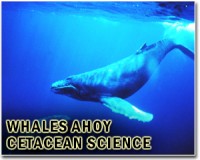| . |  |
. |
Raleigh, N.C. (UPI) Mar 4, 2011 Killer whales in the Pacific Ocean avoid being heard by their prey as they hunt by going into a cooperative "stealth mode," U.S. and Scottish researchers say. Scientists from North Carolina State University and the University of St. Andrews in Scotland studied how orcas, commonly known as killer whales, communicate when hunting mammals that can hear their distinctive calls, the BBC reported Friday. They thought the orcas might be changing their calls to a higher frequency, but they discovered instead that the whales go completely silent and yet are still able to form organized hunting groups. The researchers focused on transient orcas in the Pacific Ocean off the coast of Canada and Alaska that tend to live in smaller social groups and change locations more than resident orcas. "The most striking difference between the two is their diet," Volker Deecke from St. Andrews said. Resident orcas eat fish, whereas transients hunt and eat marine mammals including seals and porpoises. "In the 40 years that these animals have been studied, scientists have never seen a resident eat a mammal and never seen a transient eat a fish," Deecke said. Resident orcas hunt salmon using echolocation, emitting audible clicking sounds that travel through water and bounce off the fish, revealing their location. "But all marine mammals have excellent underwater hearing," Deecke said. "If a (transient) killer whale swam along clicking like mad, all the seals and porpoises would think -- here comes a predator, let's get away." The transient orcas' solution surprised the researchers. "They go into stealth mode -- completely silent," Deecke said. "This raises the question: How are they communicating?" The orcas apparently can carry out complex, coordinated mammal-hunting trips without "talking to each other" at all. Deecke says the orcas might be "rehearsing" their hunting routines to learn the position of each group member. "They tend to be very predictable," he said. "I often know exactly where they are going to surface."
Share This Article With Planet Earth
Related Links Follow the Whaling Debate
 100 whales die in New Zealand mass stranding
100 whales die in New Zealand mass strandingWellington (AFP) Feb 21, 2011 More than 100 pilot whales died in a mass stranding at a remote New Zealand beach, conservation officials said Monday. Hikers on Sunday reported finding 107 whales beached on Stewart Island, off the South Island's southwest coast, a Department of Conservation (DoC) spokesman said. He said some of the whales were already dead and DOC rangers had to euthanise the 48 remaining survivors as ... read more |
|
| The content herein, unless otherwise known to be public domain, are Copyright 1995-2010 - SpaceDaily. AFP and UPI Wire Stories are copyright Agence France-Presse and United Press International. ESA Portal Reports are copyright European Space Agency. All NASA sourced material is public domain. Additional copyrights may apply in whole or part to other bona fide parties. Advertising does not imply endorsement,agreement or approval of any opinions, statements or information provided by SpaceDaily on any Web page published or hosted by SpaceDaily. Privacy Statement |